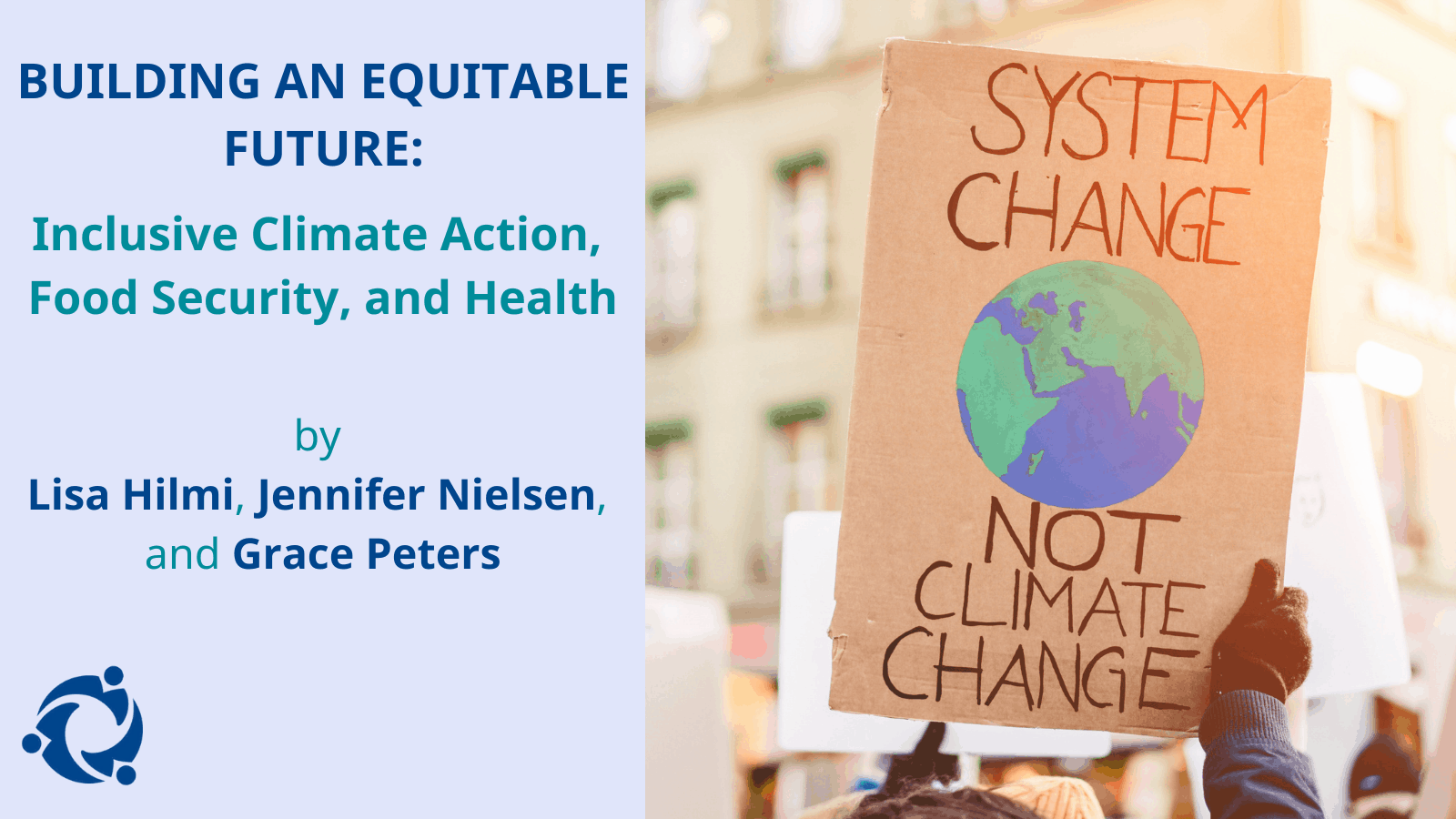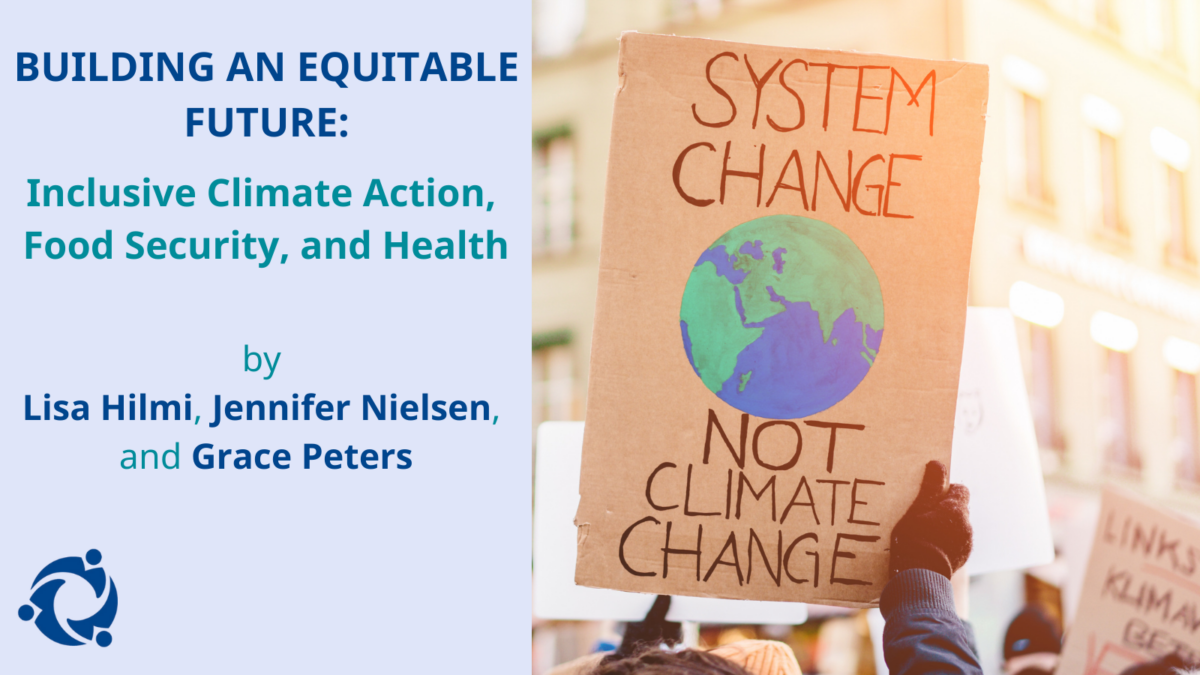
As the United Nations Food Systems Summit approaches, the world is witnessing increasingly severe climate events that make clear the urgent need to address the intersection of climate change, food security, and health. While high-income countries that have contributed the most to global climate change must take action to reduce and mitigate its root causes, local communities and low-income and middle-income countries will bear the brunt of its impact and must be prepared. Evidence has shown that addressing food security and health in partnership with local communities is highly successful. Therefore, governments and donors must create an inclusive, equitable approach to climate action, food security, and health that empowers civil society to be involved in decision-making.
The climate crisis poses increasingly numerous and severe threats to human, animal, and environmental health: rising temperatures and more extreme weather will disrupt food production, reduce the nutrient content of major crops, increase vector-borne and zoonotic diseases, and drive environmental degradation and pollution, undermining the foundations for life for humans, animals, and the earth. Amid the worldwide hardship this brings about, the hardest-hit communities are in low- and lower-middle-income countries, which by and large have contributed least to environmental destruction. For example, Nepal produces just 0.02% of global greenhouse gas emissions, but two-thirds of its population works in small-scale agriculture and is affected by escalating drought, heat, flooding and landslides—which, in turn, threaten food production, strain water resources, and damage infrastructure.
Global initiatives to address climate change and its impact on food security and health, including those from UN agencies, bilateral donors, and large foundations, tend to be dominated by experts from high-income countries in the Global North. While the generous commitment of talent, funding, and technologies is laudable, it is imperative that our collective approach be far more collaborative and actively incorporate input from the populations most acutely affected by these issues, especially those in the Global South, women, and people living with disabilities. Often overlooked in the public health sector, 1 billion people worldwide are living with disabilities, and may be disproportionately affected by the health impact of climate change without access to infrastructure that allows them to obtain adequate health services or evacuate in an emergency situation, or accessible public communications about extreme weather or emergency situations.
There are many promising approaches to mitigating the impact of climate disruption on food and nutrition security, including regenerative agriculture, silvopasture, and restoring biodiversity, but these solutions will only be effective if they incorporate local knowledge and practices honed over time and engage relevant populations. Every ecosystem has a unique set of assets and challenges, and local populations are best positioned to understand local solutions. Furthermore, community leaders and peer-to-peer groups are effective in building support for new practices because they have the trust of the community. For instance, grassroots organizations can lead successful strategies to restore habitat and build sustainable livelihoods using non-formal education techniques and participatory rural appraisal, a collaborative approach among NGOs and local farming communities, to identify the most pressing climate-related challenges and develop collective action plans to strengthen preparedness, crop diversity, and food and water access. Similarly, a comprehensive review of evidence found that the major causes of child mortality, from malnutrition to child illness, can be effectively addressed by community engagement and locally trained health workers. In addition, community workers were instrumental to the eradication of smallpox in conducting surveillance and distributing vaccines.
The global community must prioritize collaborative decision-making with local communities and find innovative, flexible mechanisms to ensure that necessary funding is available for solutions at the global, country, and local levels. New ideas from research and resources injected from wealthy nations can catalyze locally viable and sustainable solutions, but to succeed they require local knowledge, leadership, and ownership. This can only be achieved through true partnership and comprehensive community dialogue with policymakers, South-to-South cooperation, and North-to-South cooperation: the world needs all hands on deck for effective climate action.
Multilaterals, governments, and donors must rethink current approaches and do more to leverage the expertise of grassroot organizations at the country and local levels to ensure inclusive progress in addressing climate change, food security, and their related health impacts. Local representatives must have a seat at the table. Moreover, empowering local organizations and communities technically and financially is essential for long-lasting change at the community level. Only a truly inclusive approach can identify the activities and champions that can best protect human and natural resources—which will benefit countries’ economic and political stability and global well-being.
It is our hope that dialogues around the UN Food Systems Summit will bring grassroots organizations to the table in decision-making, and that governments, donors, and international NGOs will find ways to strengthen funding for locally led efforts in the collective pursuit of well-being for all.
Lisa Hilmi is Executive Director of CORE Group; Board Member/Chair of the Partnership for Maternal, Newborn and Child Health (PMNCH) NGO Constituency; and Steering Committee member of the Gavi Civil Society Organization Constituency.
Jennifer Nielsen is Senior Nutrition Advisor at Helen Keller International.
Grace Peters is Programs Associate, Comprehensive Cleft Care, at Smile Train and Co-Chair of CORE Group’s Disability-Inclusive Health Technical Advisory Group.

